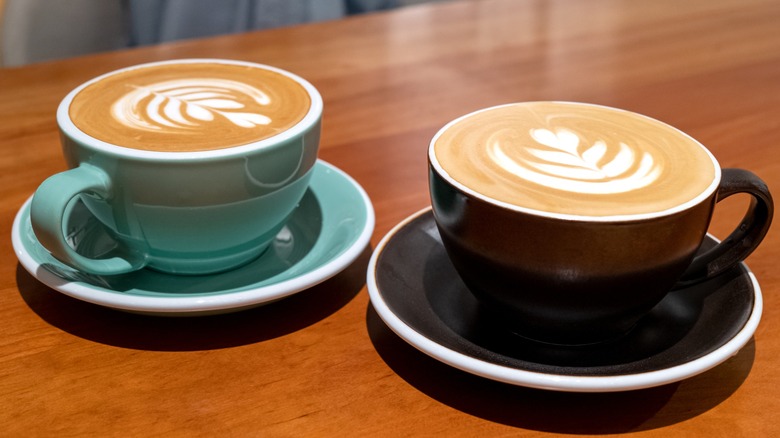Are Dunkin's Coffee Beans Ethically Sourced? Here's What We Know
When you buy a cup of coffee, you don't want it to be rippling unethicality across the globe and causing active damage. Starbucks and Dunkin' are the two biggest coffee chains in the U.S., so when it comes to either, you should do your research. Where you spend your hard-earned money matters. But the good news is, as far as providers go, Dunkin' is performing well when it comes to ethically sourcing its coffee beans. In fact, the company is self-projected to use 100% responsibly-sourced coffee by 2025, which means it doesn't have long to go. But to determine the validity of this, we must look at its actions.
For starters, Dunkin' only uses Fair Trade Certified coffee beans for its espresso. The company also sources its 100% Arabica beans predominantly from Central and South America, including Honduras and Guatemala, where it supported planting 450,000 trees in 2021. Other Dunkin' initiatives include sponsoring the World Coffee Research nonprofit, participating in The Sustainable Coffee Challenge, and supporting female empowerment work in Guatemala and Colombia. The company also partners with The Rainforest Alliance, a nonprofit agency that seeks to minimize environmental impact and improve working conditions. Unfortunately, ethicality is never a black-and-white debate.
Dunkin' has international franchises across nearly 40 countries, meaning many day-to-day operations are run independently — despite the consistency in branding and bean sourcing. In 2016, two former Dunkin' employees filed a federal lawsuit against a Chicago store after they weren't compensated for excessive overtime. While Dunkin's dedication to sustainability and human rights initiatives is promising, you should also consider the information right under your nose — and that doesn't always involve the coffee itself. Given all this scrutiny, we'd say that you have the orange light to begin researching all available details, including the real difference between Dunkin's lattes and signature lattes.
How to spot ethically-sourced coffee
A level of self-discretion is always vital when analyzing whether or not anything is truly ethical, especially in light of increasing greenwashing, in which companies make false claims about sustainability efforts. Just take the shocking January 2024 headline, for example, when Starbucks was sued for claiming its coffee was ethically sourced. Fortunately, we are focusing more on things like ethical wines, eco wines, and green wines, but it's important that we keep that same energy for our morning coffee.
The biggest green flag of all is transparency, that is, producers being open about where they purchase their coffee beans. Look for companies that clearly state their sourcing regions, then check that they contribute positively to the local communities and environment. On the flip side, a massive red flag is any ambiguous or misleading language. For instance, it's great to claim that you'll offer 100% ethical coffee by a certain date, but how will you do so? Empty claims may be unsubstantiated, and you should be always be mindful about questioning statistics.
How exactly is a company quantitatively measuring something as complex as ethicality on a simple percentile scale? When a company is the real deal, it will get nitty gritty on the specifics without you having to dig too much. Lastly, a really positive sign is third-party certifications — external reviews just carry much more weight and validity. As you can see, properly evaluating whether coffee is ethically sourced involves ticking multiple boxes. It's not just about Dunkin', either. How well do your other local coffee joints score?

